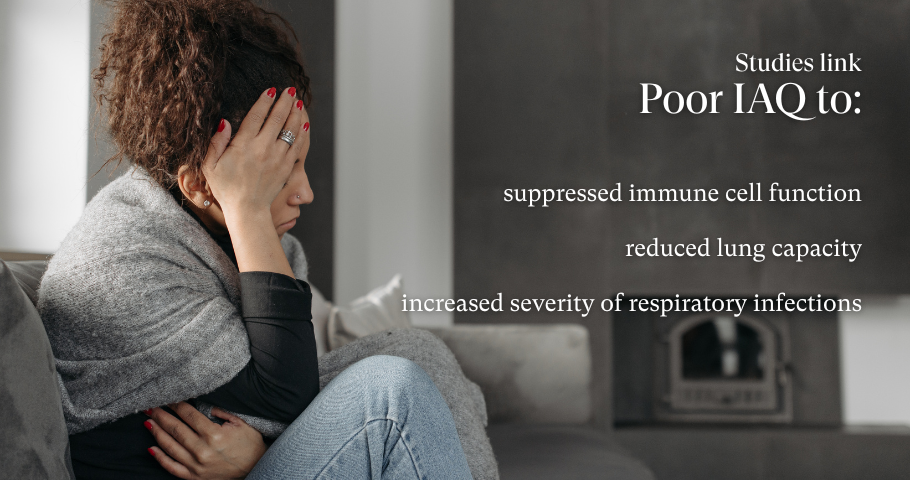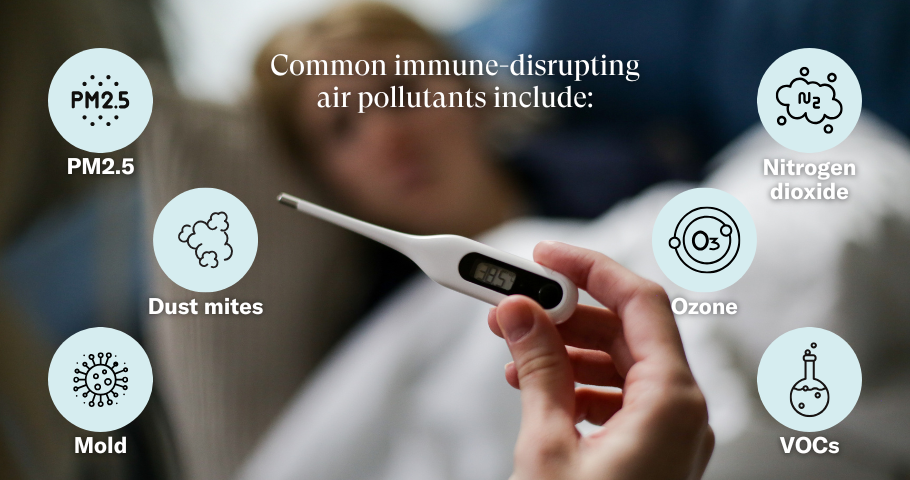IAQ and Immunity: Can Air Quality Affect Immune Systems?
Poor indoor air quality (IAQ) doesn’t just irritate your throat or make you sneeze—it may be doing something much deeper. Researchers are increasingly discovering links between IAQ and immunity, and how air pollution can compromise your body’s ability to defend itself.
From microscopic particulate matter to gaseous air pollutants, the air you breathe—both indoors and outdoors—could be increasing your virus vulnerability, chronic inflammation, and risk of immune dysfunction. In this post, we’ll explore how air quality affects immune performance, what pollutants pose the greatest threats, and how you can protect your health by taking control of your air.
1. Understanding the IAQ and Immunity
Your immune system is your body’s natural defense against harmful pathogens, including viruses, bacteria, and allergens. But what happens when the very air you breathe is filled with threats? IAQ and immunity have more effect on each other than you think.
Air pollution introduces a host of airborne irritants—like nitrogen dioxide, ozone, VOCs, and PM2.5 (particulate matter less than 2.5 microns in diameter)—that can infiltrate your respiratory tract and trigger chronic inflammation, which weakens your body’s immune response over time.
Long-term exposure to particulate matter—especially PM2.5—has been shown to interfere with immune system signaling pathways, making it harder for the body to recover from infections.
Recent studies have linked poor indoor air quality to suppressed immune cell function, reduced lung capacity, and increased severity of respiratory infections. These findings underscore the importance of improving the air in your home, not just for comfort—but for your public health.

2. The Connection Between IAQ and Immunity
You may not be able to see poor air quality, but your immune system can feel it.
Long-term exposure to air pollution can overstimulate the immune system, leading to systemic inflammation that puts strain on organs and makes it harder for the body to respond to real threats. This includes both outdoor sources—like vehicle emissions and wildfire smoke—and indoor sources like household products, cleaning agents, and cooking fumes.
When IAQ and immunity intersect, your body becomes more vulnerable to viruses, allergic reactions, and long-term chronic illness. Even short bursts of indoor pollution can have lingering effects.
Learn more about tracking air quality with SMARTView AQI, a free tool that allows you to see your local air pollution levels and tailor your home’s protection.
3. The Role of PM2.5 in Immune System Disruption
Among all air pollutants, PM2.5 is one of the most dangerous to the immune system. These ultra-fine particles are small enough to bypass your nose and throat and settle deep within the respiratory tract, where they cause oxidative stress and tissue damage.
Chronic exposure to PM2.5 has been associated with:
- Reduced function of T-cells and macrophages
- Increased oxidative stress
- Greater susceptibility to viruses
- Higher risk of autoimmune disorders
Because particulate matter is so tiny, it can also enter the bloodstream, contributing to systemic inflammation and exacerbating conditions like asthma, cardiovascular disease, and chronic fatigue.
4. Air Pollutants That Compromise Immune Defense
While PM2.5 gets most of the attention, it’s far from the only immune-disrupting pollutant. Other common air pollutants include:
- Nitrogen Dioxide (NO₂) from traffic or gas stoves
- Ozone (O₃), especially in summer months or near industrial zones
- Volatile Organic Compounds (VOCs) from cleaning supplies, paints, and synthetic fragrances
- Mold spores and dust mites, common in homes with excess moisture or poor filtration
Many common air pollutants, including volatile organic compounds (VOCs) and fumes from cleaning agents, can quietly accumulate indoors, contributing to both short-term symptoms and long-term immune suppression.
All of these air pollutants can either directly weaken the immune system or create an inflammatory environment that drains its resources.

5. Indoor Air Pollution and Its Impact
According to the EPA, indoor air pollution can be 2 to 5 times worse than outdoor levels—and we spend 90% of our time indoors. This means the quality of your indoor air may be the single most influential factor on your long-term immune resilience.
Major indoor culprits include:
- Cooking emissions, especially from gas appliances
- Poorly ventilated areas
- Household cleaners with strong chemicals
- Dust, pet dander, and mold growth
- Synthetic fragrances and air fresheners
6. Air Pollution and Virus Vulnerability
Recent global health events have intensified research around air pollution and its relationship to viral infections. Studies have shown that populations exposed to higher levels of air pollution were more likely to suffer severe symptoms during viral outbreaks.
Poor IAQ and immunity connections also extend to flu season—indoor particulate matter exposure has been shown to increase risk of influenza and slow recovery times. This has made air quality a pressing public health concern, not just an environmental one.
7. How Chronic Inflammation From Air Pollution Harms Immunity
Inflammation is the immune system’s natural way of responding to threats. But when constantly triggered by air pollutants, this system can go into overdrive. This chronic inflammation becomes destructive rather than protective.
Persistent inflammation is a risk factor for:
- Autoimmune conditions
- Asthma and COPD
- Cardiovascular disease
- Mental health decline
Reducing your home’s exposure to these irritants can prevent this cascade before it starts.
8. Monitoring Air Quality to Protect Your Health
Since we’ve identified that IAQ and immunity correlate, if you want to strengthen your immune system, start by understanding your air.
Using an air quality monitor like the SMART IAQ Sensor can give you real-time data on VOCs, PM2.5, temperature, humidity, and more. This allows you to take action when levels rise—whether by ventilating, cleaning, or turning on your air cleaner.
You can also track local conditions and pollution forecasts with SMARTView AQI, especially if you’re in a wildfire-prone or urban area.

9. How to Improve IAQ and Immunity
To reduce immune stress and lower your risk of infection or inflammation, aim for the following changes in your home:
- Ventilation: Open windows when outdoor air pollution levels are low
- HEPA Filtration: Use a medical-grade air purifier to remove airborne particles, VOCs, and PM2.5
- Green Cleaning: Switch to natural cleaners or soap and water
- Avoid Synthetic Fragrances: Choose natural scents or eliminate scent entirely
- Monitor Regularly: Install a smart air monitor to stay proactive
- Limit Toxic Products: Avoid excessive use of chlorine bleach and synthetic household products
10. Take Action with Proven Air Purification
An EnviroKlenz Air System not only captures particulate matter and airborne particles, but also neutralizes chemical air pollutants and odors. This multi-stage approach reduces the immune system’s burden and supports healthier breathing.
By investing in an advanced air purifier, you can significantly reduce air pollution in your space and give your immune system the clean slate it needs to thrive.
Better Air, Better Defense
The link between air pollution and the immune system is no longer just a theory—it’s a growing reality that can no longer be ignored. By recognizing how IAQ and immunity are connected, you can make smarter decisions to protect yourself and your family.
Whether you’re trying to reduce your virus vulnerability, calm chronic inflammation, or just support your body’s natural defenses, it all starts with cleaner air.
Take the first step: Check your AQI now and start protecting your immune health from the inside out.
